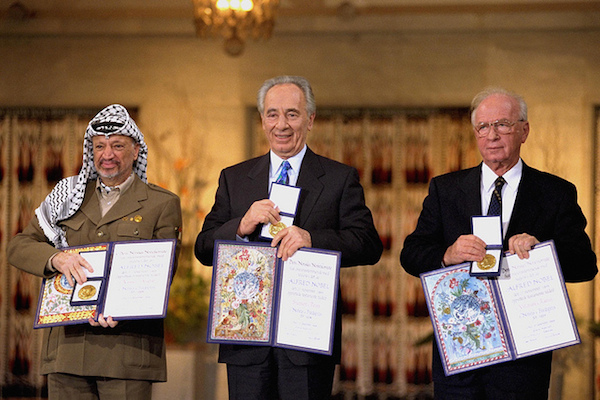For the first time since 1967, both the Israeli public and the Palestinians are likely to accept an outline for a final-status agreement based on international law.
By Shmuel Lederman

A recent poll conducted by the The Tami Steinmetz Center for Peace Research and the Palestinian Center for Public Opinion on an outline for a final-status agreement. The poll presented a “permanent agreement package” based on previous rounds of negotiation between Israelis and Palestinians, based on mutual recognition between Israel and Palestine, establishing a demilitarized Palestinian state within 1967 borders, annexing a number of settlement blocs to Israel in exchange for land swaps, and turning West Jerusalem into Israel’s capital and East Jerusalem into the capital of Palestine (with the Jewish Quarter and the Western Wall under Israeli sovereignty). Palestinian refugees will have the right to return to the Palestinian state; 100,000 of them will return to Israel as part of a family unification program, while the rest will be monetarily compensated.
Forty-eight percent of Israelis (41 percent of Jews and 88 percent of Arab citizens) and 42 percent of Palestinians in the occupied territories said they support this outline.
The poll also included “incentives” to understand what influences the views of both sides vis-a-vis a potential agreement. Thus, 40 percent of Jewish Israelis who opposed the agreement were willing to change their minds if the agreement also includes compensation for Jewish refugees from Arab countries. Thirty-four percent were willing to change their minds if Palestinians recognize the historic and religious ties that Jews have to the Lands of Israel, while a similar percentage was willing to change its mind if the the framework includes recognizing Israel as a Jewish state, and is part of a larger peace agreement with other Arab countries.
It is likely that at least some of these terms will be included in a final-status agreement between Israel and the Palestinians, such that the majority of the Jewish-Israeli public — and the majority of the Israeli public in general — is likely to support such a deal. These positions are similar to ones in previous polls vis-a-vis the Israeli public. They are extremely important for understanding the process that has taken place in Israeli society over the past two decades regarding the possibility of ending the Israeli occupation.
Many do not remember, but the Oslo Accords did not talk about the establishment of a Palestinian state, not to mention the return to 1967 borders. Rabin vehemently rejected these ideas until the day he died, and according to different estimations, assumed that a final-status agreement would include Palestinian autonomy in 50-70 percent of the occupied territories. Ehud Barak finished the Camp David Summit in 2000 with his well-known generous offer of returning 90 percent of the territories to the Palestinians. Only the Clinton Parameters in December 2000 and the Olmert proposal in 2008 reached the international consensus that has existed since 1967 on what the borders will look like. Most Israelis, then, are far more to the left than Rabin and Peres, or even Barak at the end of the Camp David Summit.

This fact, of course, does not sit well with the accepted narrative of a sharp right turn along the Israeli public in the last decades. This narrative isn’t false: the majority of the Jewish-Israeli public identifies with the political center or right, not with the left. The lack of trust by Israeli Jews toward Palestinians is very high, and nearly half of Israeli Jews support transferring Palestinians from Israel. In these respects, there is certainly much to say about a shift, even a sharp one, by the Israeli public. However when it comes to positions vis-a-vis an outline for a final-status agreement, the majority of the Israeli public now takes the position the extreme left took 20 years ago.
Even the Palestinian negotiators have gotten closer to Israel. In 1988, the Palestinian leadership accepted the international consensus on an agreement based on 1967 borders. During negotiations with Israel that have taken place in the years since, the Palestinian leadership has expressed its willingness to go beyond that consensus, accepting Israeli annexation of the settlement blocs in exchange for land swaps, annexing the Jewish Quarter in Jerusalem, and returning a symbolic number of Palestinian refugees into Israel.
The poll shows that on this issue, the Palestinian public is more or less a mirror image of the Israeli public: while Palestinians in the occupied territories do not believe in Israel’s willingness to reach an agreement, most of them accept the proposed outline, if it should include incentives such as recognizing their historic and religious ties to Palestine, rehabilitating refugees in the camps across the occupied territories, freedom of movement between countries, and the ability to work in Israel. As the pollsters summarize it: “On both sides, gestures of symbolic recognition of their historical attachment, identity and experience are among the more powerful motivator for changing attitudes in support of the package.”

As opposed to the directives by the Israeli negotiators, from Rabin and Peres through Barak and until Olmert, the expectation that Palestinians make additional significant concessions beyond what has already been proposed in the agreement always reflected a blindness to the Palestinian ability to make concessions — rather than a sober analysis of reality — basing itself on the enormous difference in power (and American support) enjoyed by Israel . In this sense, Israel underwent a radical change over the past two decades.
For the first time since 1967, the majority of the Jewish Israeli public is likely to accept an agreement based in an international consensus and law, which Palestinians may also agree to as well. The successful demonization of the left and the Palestinians in Israel, an the apparent success of the right in entrenching the settlements in the occupied territories and the left’s tendency to not recognize these kinds of significant changes — none of these change this essential fact.
This article was first published in Hebrew by the Forum for Regional Thinking. Read it here.
